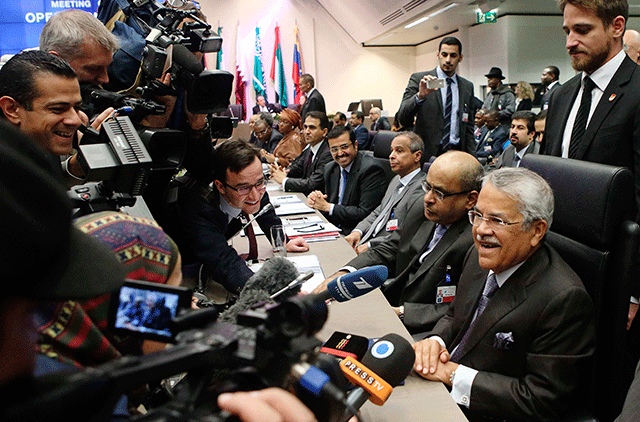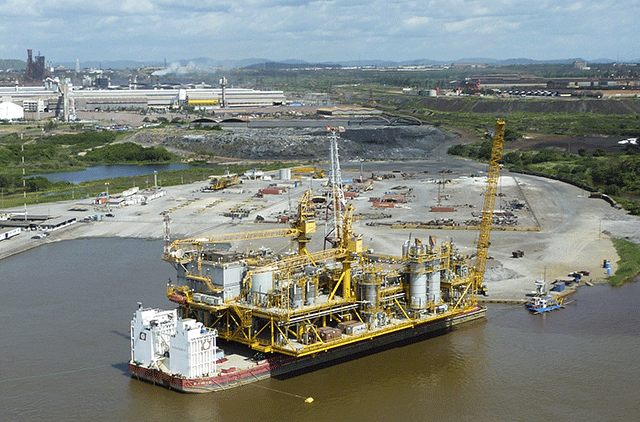
Oil slid to a four-year low amid speculation Opec will refrain from cutting output at Thursday’s meeting, dragging down shares of energy companies, Gulf-region stocks, and the Norwegian krone. Government bonds rose, with yields in Europe falling to record lows.
West Texas Intermediate crude tumbled 2.1 percent to $72.15 a barrel at 11:07 am London time, a fourth-straight decline.
While the Stoxx Europe 600 Index gained 0.2 percent after data showed record-low German unemployment, a gauge of energy producers slid 1.3 percent.
Qatar and Oman led stocks lower in the Gulf region, and Norway’s krone weakened against all its 16 major counterparts. France’s 10-year yield fell to an all-time low of 1.006 percent.
Representatives from the 12-member Organisation of Petroleum Exporting Countries (Opec) are meeting in Vienna, with oil prices mired in a bear market.
The 27 percent drop this year has pulled the Stoxx 600 Oil & Gas Index down 6.5 percent, weakened currencies of commodity-producing nations and damped inflation, helping fuel a rally in fixed-income assets. Germany will release consumer-price data today as investors weigh whether the European Central Bank will step up stimulus. Most U.S. markets are closed for Thanksgiving.
“Opec is the main event,” Michael McCarthy, chief strategist at CMC Markets in Sydney, said by phone. “The Saudis’ actions over the past month quite clearly indicate to the market that Opec is unlikely to agree to production cuts, or if they do, the market will doubt the intent to deliver.”
Output cut proposal
Venezuela said it is proposing that Opec cut output to ease a global supply glut. “Everybody has to make some sacrifice,” Foreign Minister Rafael Ramirez told reporters in Vienna Thursday as he arrived for Opec’s meeting.
He said the market was oversupplied by about 2 million barrels a day, equal to or more than what six of OPEC’s 12 members produced last month.
Crude oil slumped into a bear market this year as global demand growth weakened and U.S. production expanded to a three- decade high, bolstered by fracking.
“Venezuela wants to see production cuts and a higher price,” Bjarne Schieldrop, chief commodities analyst at Oslo- based SEB, wrote in an e-mail.
“With Saudi holding the view of no cuts and same seems to be the case for the GCC, it is hard to see that there will be any cuts today,” he said, referring to Gulf Cooperation Council members Saudi Arabia, Kuwait, Qatar and the United Arab Emirates.
While Ramirez didn’t specify the size of the cut, he said it should be similar to the reduction the group made at Oran, Algeria, in 2008.
Opec cut its target then by 2.46 million barrels a day amid the global financial crisis. Ecuador supports Venezuela’s position and the two countries will make a joint proposal, he said.
Split Opinion
Crude prices have collapsed this year amid the highest US oil output in three decades and signs of slowing demand globally.
Opec, which pumps about 40 percent of the world’s oil, will discuss its official production target of 30 million barrels a day at the meeting in Austria.
Iran’s oil minister said his nation’s view on oil markets is close to that of Saudi Arabia, whose representative said Wednesday that prices will stabilise themselves without the need for production cuts.
Brent crude sank 2.4 percent to $75.90 a barrel, reaching its lowest level since September 2010.
BG Group Plc fell 1.7 percent, BP Plc slipped 0.9 percent and Royal Dutch Shell Plc declined 1.2 percent.
Saudi Arabia’s Tadawul All Share Index, which is down more than 18 percent from this year’s peak, fell 0.4 percent as indexes in Oman and Qatar dropped 1.6 percent and 1.4 percent, respectively.
Krone crumbles
Norway’s krone, the second-worst performer against the dollar this year among 16 major counterparts, weakened 1.4 percent to 6.9217 per dollar. Norway is the biggest oil producer in Western Europe.
The euro declined 0.3 percent to $1.2473 as regional data showed consumer prices stagnating or dropping in Germany. ECB President Mario Draghi told the Finnish parliament today that current stimulus has yet to work through to the real economy, and also referred to the possibility of more to come.
Government bonds gained. Germany’s 10-year yield fell to a record 0.709 percent and the U.K.’s 30-year yield set an all- time low of 2.697 percent. Italy sold five- and 10-year debt at record-low rates.
Shell’s CDS
Yields on investment-grade bonds in euros approached a record low, falling to an average 1.16 percent, Bank of America Merrill Lynch Index data show.
The cost of insuring corporate debt fell to a two-month low, with the Markit iTraxx Europe Index down one basis point to 59 basis points, according to data compiled by Bloomberg.
Credit-default swaps on Shell, Europe’s biggest oil company, were the worst performing in the benchmark this month, climbing 35 percent to 46 basis points.
The Stoxx 600 rose, extending its biggest monthly gain since February. Germany’s DAX Index added 0.5 percent for an 11th day of advances, the longest streak since May 2013.
Remy Cointreau SA climbed 2.3 percent after the French cognac maker reported first-half operating profit that exceeded analysts’ estimates. The volume of Stoxx 600 shares changing hands was 35 percent lower than the 30-day average, data compiled by Bloomberg show.
The MSCI All-Country World Index fell 0.1 percent after a five-day gain, the longest streak since July, while a “technical incident” halted all Euronext NV indexes, including France’s CAC 40 Index, Portugal’s PSI 20 Index and the Netherlands’ AEX Index. Euronext said on its website there will be no dissemination of all its indexes until further notice.
Shanghai Volumes
The Shanghai Composite Index closed at the highest since August 2011 amid record turnover. China’s central bank refrained from selling repurchase agreements in open-market operations for the first time since July, further loosening monetary policy after cutting interest rates for the first time since 2012.
The surge in Chinese equity trading that coincided with market peaks in 2009 and 2010 is back again. The 30-day average daily value of shares changing hands on the Shanghai exchange exceeded 200 billion yuan ($32.6 billion) for the first time in four years on Nov. 25, after rising threefold in the past six months, according to data compiled by Bloomberg.
The MSCI Emerging Markets Index advanced 0.2 percent as Samsung Electronics Co., the world’s biggest mobile-phone maker, rallied the most in four weeks on a plan to buy back $2 billion of its shares.
Won, Ruble
South Korea’s won gained for a fifth consecutive trading day, rising to 1,098.36 per dollar, the longest streak since July 3. The country’s current-account surplus increased to $9 billion for October, compared with a revised $7.4 billion in September, the central bank reported today. The ruble weakened 0.1 percent, extending a three-day decline as Brent retreated.
Gold for immediate delivery fell to $1,195.90 an ounce after assets in the largest exchange-traded product shrank to a six-year low. Silver retreated 0.7 percent to $16.4065.
The Standard & Poor’s 500 Index rose to a record yesterday. It’s added 11 percent from last month’s low and is heading for its biggest monthly gain since June.













